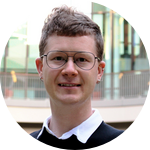
Samuel Thompson
Stanford, CA
Stanford University, Departments of Bioengineering and Genetics, Sarafan ChEM-H Institute and the University of Washington, Institute for Protein Design
Arnold O. Beckman Postdoctoral Fellow
More
I use the power of templated synthesis (e.g. ribosomal synthesis) to develop materials with world-changing potential by controlling angstrom scale structure and molecular function. As a postdoctoral scholar, my long-term goals are to pursue an independent academic research program centered on engineering functional proteins to address global needs for carbon neutral fuel sources, and environmentally sustainable industrial materials, diverse antibiotics that combat the rise of pathogenic resistance, and new therapeutic modalities that interface with lipid biology. Specifically, I aim to expand the usefulness of protein biotechnology by developing methods for using protein in chemical environments other than water.
My background is first rooted in materials science and functional polymer chemistry from my high school research in the lab of Prof. Zhibing Hu (University of North Texas). I then chose to focus on proteins as a programmable polymer material, and I pursued natural protein re-engineering with Prof. Alice Ting (MIT, Stanford University) followed by structural biology studies of large enzymatic complexes with Prof. Catherine Drennan (MIT) and Prof. Junichi Takagi (Osaka University). Observing the limitations of rational design and screening-based approaches for identifying protein catalysts for non-natural reactions and reaction conditions, I chose to center my graduate studies on computational protein design in the lab of Prof. Tanja Kortemme (UCSF). This project took on a large cell biology component when I traced the origins of unusual observations in a deep mutational scanning experiment and ultimately identified a quality control protease that modulates the mutational landscape for in vivo selection in E. coli. Thus, my experience has been both broad and exploratory while also tightly focused on my primary motivation: expanding the potential in protein engineering by quantifying sequence-structure-function-environment relationships.
October 2023